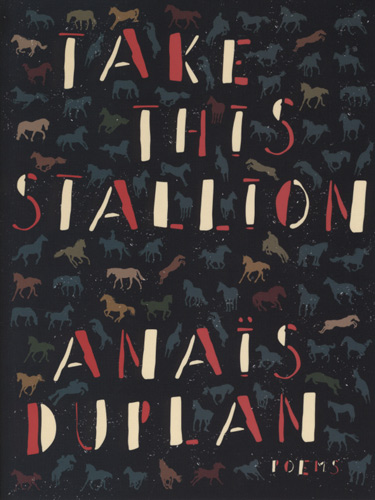Take This Stallion
You and I are filthy but it is / our filth” — “The Flying Phalangers”
Popping with pop culture. Zinging with Net slang. Formless yet formed. Slick and rough. Dating-sites and Netflix and Martha Stewart and Kendrick Lamar and Kim Kardashian and TMZ and ENVY and funerals and coke and religion and love and names become algebra and no one knows where they stand except on the cusp of a new paradigm, a new aesthetic—Take This Stallion is a force of poetic nature.
You and I are filthy but it is / our filth” — “The Flying Phalangers”
Popping with pop culture. Zinging with Net slang. Formless yet formed. Slick and rough. Dating-sites and Netflix and Martha Stewart and Kendrick Lamar and Kim Kardashian and TMZ and ENVY and funerals and coke and religion and love and names become algebra and no one knows where they stand except on the cusp of a new paradigm, a new aesthetic—Take This Stallion is a force of poetic nature.
Anais Duplan’s debut collection, published by Brooklyn Arts Press, is eclectic, epic, and provocative. The opening 16-page poem, “On a Scale of 1-10, How ‘Loving’ Do You Feel?” discombobulates and challenges. While a refrain of, “I bet Kim . . . ” anchors the stanzas, Duplan confronts the fluffy triviality of quotidian existence and then last some heart-stopping jabs:
Sometime silence means
I love you sometimes
it means my phone is in the toilet
How do I know which is which
Structurally the poems are as diverse as their themes. Letter poems placed beside traditional stanzas (with superb enjambment) are slipped between tercets and solid prose. Throughout the collection, characters are replaced by geometric shapes, creating mystery and universality:
Dear △,
Looking down from the top of Victoria, I found ten
thousand steel prisms. O Hong Kong! As it turned
around, I saw the bodies of two Black Kites, which,
overlooked the city, had turned to steel. I felt my
body become cool and shiny [ . . . ]
Yours,
⬛
Circles, square, triangles, diamonds, and stars appear where names would normally stand in for people. This choice creates awareness, mystic, and calculations. A little mystery goes a long way in a short collection.
In the prose paragraph, “On How to Win with or without Trying,” Duplan writes (which may be a sub-conscious key to what she is accomplishing):
We can’t explain to our friends that nothing can be taken for granted, not even fingernail clippings. We adjust our sex, our shapes, invent new sounds for pleasure. I say, My best deeds are slander, libel and late night apology. He says, I’m not here for that. We don new shapes. We study the voices of people diverging with scholarly disinterest. In evenings, I return to the church and lie at its base keeping in mind that the fingernails continue to grow.
Like Ginsberg and Whitman, Duplan is widening the American Canon. Sex, death, race, injustice, technology, grief, drugs, love, and joy are melted in a pot thrown down the stairs and out the door, kicked around on a sporting field and re-assembled on the pages, which give hope without ignoring the ugly realities we have created. A survival guidebook and a map to joy, Take This Stallion is a wild ride, not for the weak of heart, not for the shallow of soul, but a glorious epiphanic expression of living poetry.
Anais Duplan should be lauded, not only for this debut collection, but for her literary citizenship. After a quick Internet search, it’s clear that her visual art and her work with the Afro-Futurists, an artist residence program in Iowa City, are being used to build awareness, promote diversity, and expand opportunities. Duplan is not writing or living in a vacuum. She is an artistic and social inspiration, a strong refreshing breeze that fills the battle field with hope.





